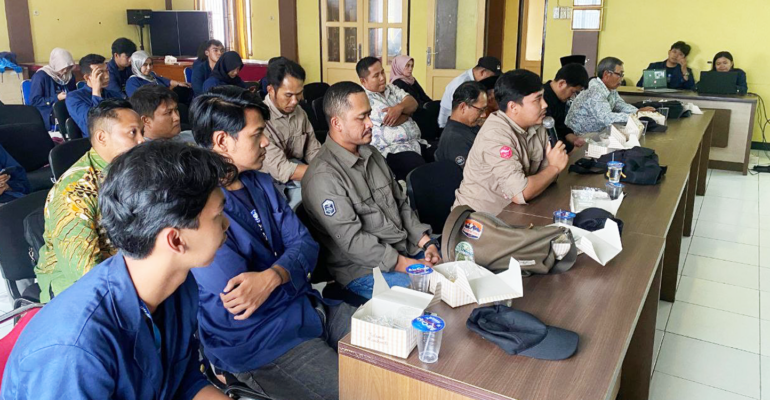IPB University Innovation KKNT Students Raise Social Forestry Program in Bungbulang District

IPB University students from two Thematic Real Work Lecture (KKNT) Innovation groups started their program in Mekarbakti Village and Bojong Village, Bungbulang District, Garut Regency, West Java.
The arrival of the students is highly anticipated by the residents to help address local problems, especially related to social forestry. The two villages had just received Social Forestry Certificates from the Ministry of Environment and Forestry.
The reception and Workshop 1 of KKN-T Inovasi IPB University Bungbulang Sub-district was held at the Bungbulang Sub-district office hall. The purpose of this activity is to explain the work program that will be implemented during KKN-T and get input from the community.
Fajar Ilham Pratama and Agung Saputra, KKN-T team coordinators, explained the main work program for 40 days. This program includes mapping the boundaries of cultivated land, assisting the Social Forestry Business Group (KUPS), developing tourism potential, managing fisheries and livestock cultivation, socializing animal feed, utilizing forest products, and refining the tourism village master plan.
Mekarbakti Village Chief, Gugun Gunawan, expressed his appreciation to IPB University for placing KKNT Innovation students in his village. “Hopefully IPB students can have a positive impact on the development of Mekarbakti Village, especially in the utilization of social forestry,” he said. The Chairman of the Mekarbakti Village BPD, Tatang Mulyana, also added his hope that a mutually beneficial relationship can be established between students and the village community.
Bojong Village Secretary, Denih, hopes that the presence of KKNT Innovation IPB University students can help solve problems in his village. “With the presence of these students, we hope that the community can absorb knowledge and students can practice their knowledge,” he said. Bojong Village has a lot of potential that has not been maximized, especially in the fields of tourism, fisheries, and animal husbandry.
Representatives of Bojong Village said that 80 percent of houses in the village have ponds and 60 percent have livestock. However, this potential has not been maximally developed because the community only manages it for their daily needs. The presence of IPB University students is expected to help develop this potential into a bigger business.
The village, sub-district, and Koramil fully support the implementation of this KKNT Innovation activity to help the community in problem solving. Strong synergy between parties is expected to optimize the Annual Work Plan (RKT) of Social Forestry, thus providing maximum benefits for the surrounding community. (*/Rz) (IAAS/Aly)



